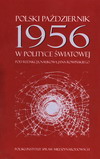British Responses to the Polish Events, June-November 1956
British Responses to the Polish Events, June-November 1956
Author(s): Anne DeightonSubject(s): Politics / Political Sciences
Published by: PISM Polski Instytut Spraw Międzynarodowych
Summary/Abstract: Poland.s political drama of 1956 stretched from June to the beginning of November, and resulted in the return to power of W³adyslaw Go - mu³ka as First Secretary of the Polish Communist Party. However, they did not involve Britain, which neither volunteered, nor wanted to play a role. There were two principal reasons for this. The first reason related to British perceptions of Eastern Europe during these years. Foreign Office attitudes to individual Eastern European satellites were shaped by its wider attitude to the Soviet Union. While Poland was considered to be the most important of the satellite states because of its size and geographic position between East Germany and the Soviet Union; because of the power of the Catholic Church there; and because of its broader historical significance in international politics, Britain was not powerful enough to play a leading role in Eastern European politics. Further, the Geneva summit of 1955 seemed to indicate a new approach to East-West relations in Europe, a respite from Cold War antagonism, and the hope of more .normal. East-West relations. The visit of First Secretary of the Communist Party of the Soviet Union, Nikita Khrushchev, and Nikolai Bulganin (Chairman of the Council of Ministers) to Britain in April 1956 was part of the new Soviet .war of smiles.. The Soviet visitors had nevertheless made it clear that the cohesion of the Eastern European blo bloc remained of overwhelming strategic importance to the Soviet Union
Journal: PISM Series
- Issue Year: 2007
- Issue No: 4
- Page Range: 239-262
- Page Count: 24
- Language: English

